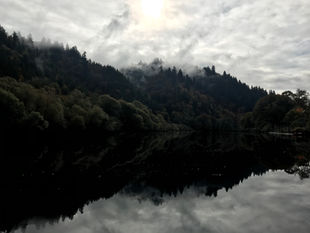
I once accompanied a group of indigenous Mapuche living in Chile across the Argentinian border. We wound through the Andes on a bus, chewing coca leaves to stem the nausea, eyeing signs that warned of jaguars. We passed from one side of the Mapuche homeland into the other, Argentina. 150 years ago, a border was laid across their territory: an invisible line rendered real by law, by crossing points and guards and dogs. The line turned a wall into a set of doors that opened for westerners.
That day, the Chilean Mapuche were visiting their Argentinean counterparts. They had never met before.
In a small, single-room cabin with open doors at both ends, men spoke to one another in a mix of Spanish, which I understood, and Mapudungun, which I did not. I had been told that the Mapudungun lexicon was smaller than that of English and Spanish, but that the words were poured full of meanings that a non-native (non-Native) speaker would struggle to grasp. The word for 'pig' signified the animal and the species, each one that had ever lived and would ever live, and the many ideas that the animal represented. Ingesting that language meant knitting together meaning from words, layers of cultural context, setting, and the relationship of the speaker to the listener.
I think now of 'ōlelo Hawai'i, which I knew little of at the time (still, what I know is only a thimble-full). What I know is that piko is the place where stem meets leaf, and it is also the place where the umbilical cord meets an embryo. It is our connection to ancestors, and to our descendants.
The piko is a spiritual throughline.
What I know is that sovereignty is rooted in both language and land, and that Mapudungun itself means the language of the land. This mother tongue was sowed thousands of years ago, and has bloomed through Incan, Spanish, Chilean, and Argentine rule, its meaning mercurial, its adoption perennial, sustained by generations who still speak, in certain rooms, as their ancestors did.
As their descendants will.









